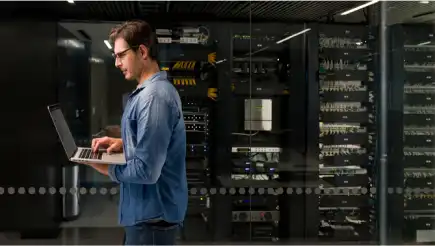Learn AWS Kinesis with online courses and programs
What is AWS Kinesis?
AWS Kinesis is a suite of fully managed services provided by Amazon Web Services (AWS) that enables businesses to process and analyze streaming data at any scale. Amazon Kinesis offers real-time data ingestion, processing, and storage, so you can use the data for machine learning, analytics, and other applications.Footnote 1
The AWS Kinesis suite includes several services:Footnote 2
AWS Kinesis Data Streams enable you to capture, process, and store data streams.
Amazon Kinesis Data Firehose provides you with Extract, Transform, and Load (ETL) services. It reliably captures and transforms streaming data and delivers it to data lakes, data stores, and analytics services.
AWS Kinesis Data Analytics is another service the platform provides that enables you to transform and analyze streaming data using Apache Flink.
AWS Kinesis Streams is a service that allows businesses to securely stream video from connected devices to AWS for analytics, machine learning, playback, and other processing.
Browse online AWS Kinesis courses
Stand out in your field
Use the knowledge and skills you have gained to drive impact at work and grow your career.Learn at your own pace
On your computer, tablet or phone, online courses make learning flexible to fit your busy life.Earn a valuable credential
Showcase your key skills and valuable knowledge.
AWS Kinesis tutorial curriculum
If you are interested in learning about AWS Kinesis, online courses could help you master the platform. Online AWS Kinesis tutorials will introduce learners to the basics of the tool, including its purpose, architecture, and features. They may teach you how to:
Use Kinesis services, such as Kinesis Data Streams, Kinesis Data Firehose (sometimes called AWS Kinesis Firehose), Kinesis Data Analytics, and Kinesis Video Streams.
Create and manage Kinesis data streams.
Write code to produce data for Kinesis streams and consume data from Kinesis streams.
Use the Advanced Amazon Kinesis Client Library (KCL).
Scale and manage Kinesis data streams.
Monitor and troubleshoot Kinesis data streams using CloudWatch.
Integrate Kinesis with other Amazon Web Services or third-party tools and services.
Build real-time streaming applications using Kinesis and other Amazon Web Services.
Start building your knowledge of data management with edX. From accelerated boot camps on topics like coding to comprehensive programs that allow you to earn a bachelor’s degree or (for more advanced learners) a master’s program, there are many different learning formats available to fit your needs. Busy professionals can even take advantage of executive education courses tailored to those in leadership and management positions. Find the right course for you.
Explore AWS Kinesis jobs
AWS Kinesis is a valuable tool used by professionals across the tech industry. Jobs in which knowledge of Amazon Kinesis can be beneficial include:
Amazon developer: An Amazon developer develops and maintains Amazon software and applications. Knowledge of AWS services, such as Kinesis, is essential for this role.Footnote 3
AWS cloud-native engineer: An AWS cloud-native engineer is a type of cloud engineer that is responsible for designing and building cloud-native applications and services that run on AWS.Footnote 4 They can use services, such as Kinesis, to build real-time streaming applications.
Platform engineer: A platform engineer develops and maintains the infrastructure that supports an organization's applications and services.Footnote 5 They may use AWS services like Kinesis to process and analyze data in real-time.
ROR developer: A Ruby on Rails (ROR) developer specializes in using the Ruby on Rails framework to build web applications.Footnote 6 They may use Amazon Kinesis to process and analyze data within their applications.
Full-stack developer: A full-stack developer is responsible for developing both the front-end and back-end of web applications.Footnote 7 They may use AWS Kinesis to process and analyze real-time data in their application architecture.
AWS developer: An AWS developer is responsible for developing and maintaining applications and services that run on AWS. Knowledge of services like Kinesis is essential to build real-time streaming applications.
Kubernetes engineer: A Kubernetes engineer is responsible for deploying and managing applications that run on Kubernetes, an open-source container orchestration system.Footnote 8 They may use Amazon Kinesis to process and analyze data within their applications.
Many other job titles may also use Amazon Kinesis, such as data engineers, data analysts, and data scientists. Start building the skills you need to pursue these jobs with edX.
How to use AWS Kinesis in your career
You can use AWS Kinesis in various professional capacities:Footnote 9
Create real-time custom applications: With Amazon Kinesis, you can build apps for application monitoring, fraud detection, and live leaderboards. Data can be analyzed and emitted to any data store or application, making it easy to build real-time applications.
Perform real-time data analytics: Amazon Kinesis allows you to evolve from batch to real-time analytics. This way, you can get the latest information and insights without delay.
Analyze IoT device data: With Amazon Kinesis, you can process streaming data from IoT devices. You can use this data to programmatically send real-time alerts and respond when a sensor exceeds certain operating thresholds. This feature is handy for IoT developers who want to analyze real-time data.
Build video analytics applications: Lastly, Amazon Kinesis can stream video securely from camera-equipped devices. It allows users to use streams for video playback, security monitoring, face detection, machine learning, and other analytics. This feature is handy for video analytics professionals who want to build applications for various use cases.

